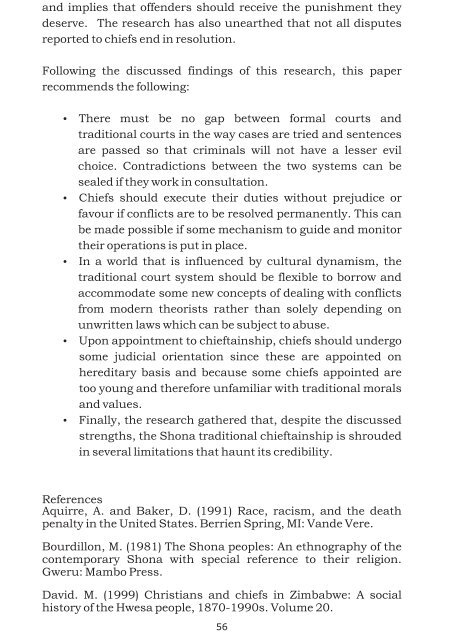Beneficiaries are actors too.pdf - Southern Institute of Peace ...
Beneficiaries are actors too.pdf - Southern Institute of Peace ...
Beneficiaries are actors too.pdf - Southern Institute of Peace ...
You also want an ePaper? Increase the reach of your titles
YUMPU automatically turns print PDFs into web optimized ePapers that Google loves.
and implies that <strong>of</strong>fenders should receive the punishment they<br />
deserve. The research has also unearthed that not all disputes<br />
reported to chiefs end in resolution.<br />
Following the discussed findings <strong>of</strong> this research, this paper<br />
recommends the following:<br />
<br />
<br />
<br />
<br />
<br />
There must be no gap between formal courts and<br />
traditional courts in the way cases <strong>are</strong> tried and sentences<br />
<strong>are</strong> passed so that criminals will not have a lesser evil<br />
choice. Contradictions between the two systems can be<br />
sealed if they work in consultation.<br />
Chiefs should execute their duties without prejudice or<br />
favour if conflicts <strong>are</strong> to be resolved permanently. This can<br />
be made possible if some mechanism to guide and monitor<br />
their operations is put in place.<br />
In a world that is influenced by cultural dynamism, the<br />
traditional court system should be flexible to borrow and<br />
accommodate some new concepts <strong>of</strong> dealing with conflicts<br />
from modern theorists rather than solely depending on<br />
unwritten laws which can be subject to abuse.<br />
Upon appointment to chieftainship, chiefs should undergo<br />
some judicial orientation since these <strong>are</strong> appointed on<br />
hereditary basis and because some chiefs appointed <strong>are</strong><br />
<strong>too</strong> young and therefore unfamiliar with traditional morals<br />
and values.<br />
Finally, the research gathered that, despite the discussed<br />
strengths, the Shona traditional chieftainship is shrouded<br />
in several limitations that haunt its credibility.<br />
References<br />
Aquirre, A. and Baker, D. (1991) Race, racism, and the death<br />
penalty in the United States. Berrien Spring, MI: Vande Vere.<br />
Bourdillon, M. (1981) The Shona peoples: An ethnography <strong>of</strong> the<br />
contemporary Shona with special reference to their religion.<br />
Gweru: Mambo Press.<br />
David. M. (1999) Christians and chiefs in Zimbabwe: A social<br />
history <strong>of</strong> the Hwesa people, 1870-1990s. Volume 20.<br />
56


